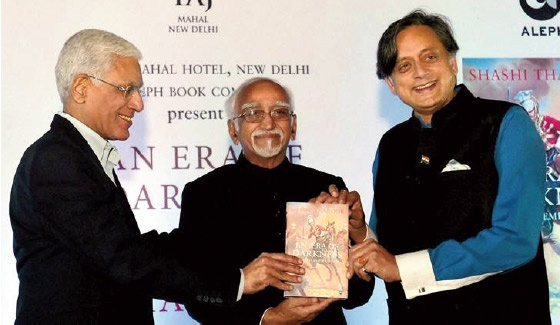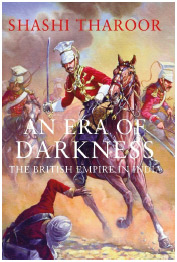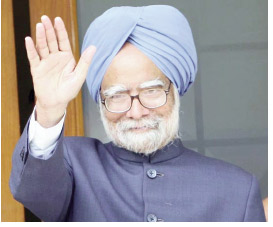
 |
LEARNING FROM HISTORY
Looking at Britain, Shashi Tharoor styleThe wrongs of yesterdays helps us to understand the present reality. Writer diplomat-turned-politician Shashi Tharoor makes a case for learning from the pages of history, reports Vidyarthi Kumar.
On the British 'policy of Divide and Rule' – as articulated also by Hamid Ansari, the former Union Minister said that Britons pursued a "conscious" policy, especially to divide Hindus and Muslims. "The war of 1857 had actually frustrated the Britons as they saw Hindus and Muslims marching together to protect the monarchy for a Muslim ruler," Tharoor remarked. He and even others at the book release venue agreed about Hindu-Muslim disunity after Britons played up the Divide and Rule card. According to Tharoor, the colonial masters ingrained amongst Muslims the fearof the Hindu majority. "It led Muslims to feel the burden of the complexity," Tharoor opined. While the British hand in dividing Hindus and Muslims goes without saying, Tharoor assertively maintained that the colonial masters also exploited Indian caste system – among Hindus - to keep Indians divided. Prior to the British rule, the caste system in India was "more fluid", he contended strongly. "The consequences were tremendous," Tharoor said adding the impact on both Hindu-Muslim disunity and the caste divisions are being felt even today. On a different plane – but an issue – he has been very forthrightly trying to put across, the Congress MP said he would demand an apology from Britain for the wrong doings and misgovernance during the colonial rule. Stating that the Britons should also teach their children the "true history of the "horrendous colonial rule in India",Tharoor stuck to his gun: "To say a simple sorry will wash out a lot". The British scholars have only portrayed "one-sided view"of their rule in India. He suggested the British children should know the past in which their forefathers indulged in loot of India. "After all, the beauties of the city like London were built by the resources taken away from India," Tharoor said,adding "the loot in fact was extensive." On the 'apology' from Britain for the colonial misrule,Tharoor maintained he was not expecting the "apology" from Britih Prime Minister Theresa May. Incidentally, the book release function was held on November 4 – just a couple of days before May's first visit to India November 7. To a question, he answered saying Britain has constantly suffered from"deliberate historical amnesia" about their wrong doings during their colonial rule in India. Therefore,in this context, he said his decision to pen the book at this juncture - 70 years after Indian Independence – was justified.Tharoor said his book – 'An Era of Darkness : The British Empire in India' would serve a lesson for many who probably did not know about the British brutality and misrule. The book would be a lesson for Indians too as he said rather wryly, "If you do not know where you are coming from, how will you know where you are going". On the 'apology' from Britain for the colonial misrule,Tharoor maintained he was not expecting the "apology" from Britih Prime Minister Theresa May. Incidentally, the book release function was held on November 4 – just a couple of days before Theresa May's first visit to India November 7. |
|


 Shashi Tharoor (right) with Vice President M Hamid Ansari and
journalist Karan Thapar at the release of his book 'An Era of Darkness:
The British Empire in India'
Shashi Tharoor (right) with Vice President M Hamid Ansari and
journalist Karan Thapar at the release of his book 'An Era of Darkness:
The British Empire in India'
 Manmohan Singh
Manmohan Singh